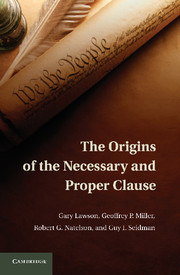Book contents
- Frontmatter
- Contents
- Acknowledgments
- 1 Raiders of the Lost Clause
- 2 Discretionary Grants in Eighteenth-Century English Legislation
- 3 An Ocean Away
- 4 The Legal Origins of the Necessary and Proper Clause
- 5 The Framing and Adoption of the Necessary and Proper Clause
- 6 Necessity, Propriety, and Reasonableness
- 7 The Corporate Law Background of the Necessary and Proper Clause
- Index
- References
7 - The Corporate Law Background of the Necessary and Proper Clause
Published online by Cambridge University Press: 03 May 2011
- Frontmatter
- Contents
- Acknowledgments
- 1 Raiders of the Lost Clause
- 2 Discretionary Grants in Eighteenth-Century English Legislation
- 3 An Ocean Away
- 4 The Legal Origins of the Necessary and Proper Clause
- 5 The Framing and Adoption of the Necessary and Proper Clause
- 6 Necessity, Propriety, and Reasonableness
- 7 The Corporate Law Background of the Necessary and Proper Clause
- Index
- References
Summary
The Necessary and Proper Clause is perplexing. Perhaps the single greatest source of congressional power, a cornerstone of the modern administrative state, a trump card authorizing federal domination over many issues of national life, a symbol, for some, of the power of governments to improve the life of their citizens – it is all these, and more. Yet its terms are anything but pellucid. What does “necessary” mean? What about “proper”? What is the relationship between these words? The Constitution itself offers little clue. The phrase emerged from the Committee of Detail without clarification. The records of the Constitutional Convention provide scant evidence as to how the framers understood the clause, and the ratifying debates are not illuminating. Prior to the Supreme Court's 1819 decision in McCulloch v. Maryland, the clause appeared to have been nearly forgotten.
The odd contrast between the importance of the clause and the lack of attention given to it during the founding era suggests that its terms must already have been in common usage. “Necessary and proper” feels like a lawyer's clause – a standard provision that, despite its importance, is not usually the subject of negotiation or debate. If the clause was indeed one commonly found in legal practice, it would be understandable why so few people found it worthy of analysis or attention at the time of its drafting.
- Type
- Chapter
- Information
- The Origins of the Necessary and Proper Clause , pp. 144 - 176Publisher: Cambridge University PressPrint publication year: 2010

